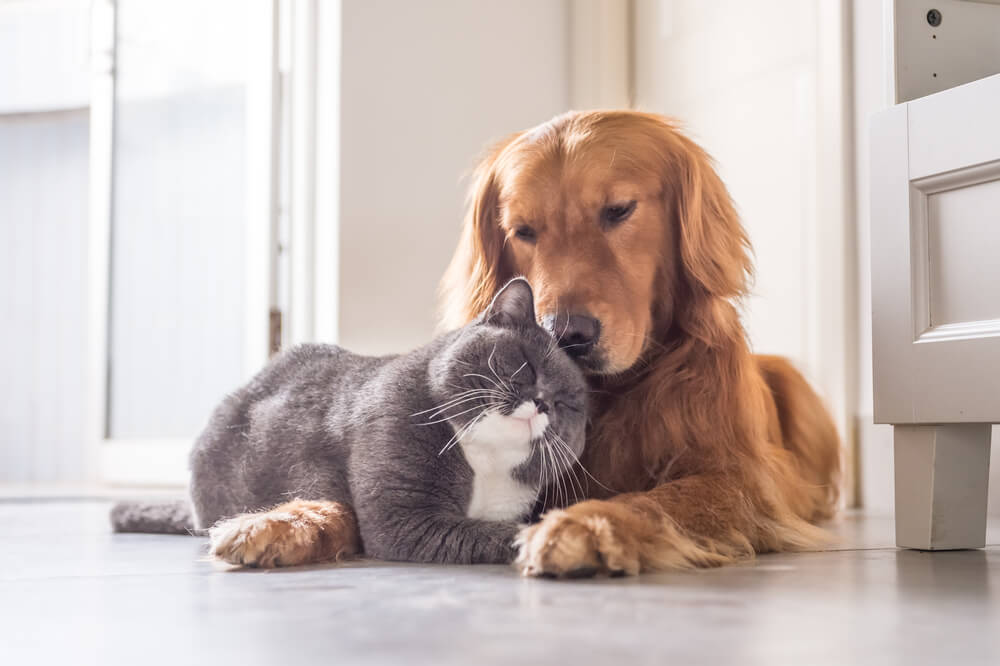The owner of the house: how self-isolation of people affects pets
'04.04.2020'
Source: TASS
Coronavirus has changed the lifestyle of many people. Now some work remotely from home. Although, say zoopsychologists, our dogs and cats are not always happy about this. Pets will have to get used to the fact that the apartment is nowl crowded and noisy. This can lead to stress, loss of appetite and aggression in the animal. However, the bad can be avoided if you spend a forced vacation fun and for the benefit of everyone, writes "TASS".

Which pets respond to quarantine?
Everything. The pet’s head has a schedule for the owner’s presence, said Sergey Chernikov, president of the Association of Applied Zoopsychology. When the mode fails, the animal responds to this. Any animal can lose peace, even a cold-blooded lizard, however, its experiences will not be as strong as that of a cat or dog. This is due to the structure of the brain: in mammals, it is the most complex, which means that emotions are more pronounced and deep.
The level of stress depends on the breed of the animal, its intelligence. For example, it is more difficult for Yorks and a Chihuahua to get used to the fact that the whole family is at home than a shepherd or a Labrador. If a dog was trained and trained, it interacts better with people, so it will calmly survive quarantine.
Another factor is the individual characteristics of the pet. For some, the psyche is very fragile, notes the zoopsychologist Marianne Gladkikh. A cat that was taken from a shelter can be very frightened. Most likely, she had a painful experience in communicating with people and she is afraid of any changes.
What happens to dogs and cats?
The first days a new habit is formed: the owner is always there. Pet behavior may change. Do not be surprised if your dog has become more active, everywhere follows you, looks into your eyes, wags its tail and screeches. This means she likes everything, she is glad of your presence, but still alarmed. If the emotional background in the house is even, the pet will calm down and return to its previous behavior in a few days.
On the subject: While the owner was sick: the cat spent 40 days alone in the apartment, survived and gave birth to kittens
In cats, everything is different, says zoopsychologist Yekaterina Bukharova. Territory is important for them, not human emotions, so the main condition for them is that the house should be comfortable. The cat perceives the apartment as its space and loves to move around it freely. If you took her favorite chair in the living room and sit in it all day, wait for a negative reaction. The cat will be nervous, express its dissatisfaction, or will avoid contact with an unkempt owner.
How to recognize the emotions of a pet?
The tail, eyes and ears are the main beacons that will tell you about the mood of the animal. For example, slow tail movements in dogs are likely to indicate calm and positive mood, while in cats - about discontent.
Keep track of other changes, such as activity. The animal may become more mobile and sociable in the early days, but this will be followed by a decline. Stress is manifested in the form of reduced motility.
Here are some more signs that something is wrong with your pet:
- the animal hides and avoids contact;
- shortness of breath and uncontrolled urination appeared;
- disappeared or increased appetite;
- the pet began to bark, meow, squeak and mark territory more often.
You should not attribute human qualities to animals. If the cat broke the vase, this is not revenge for the fact that you are still sitting in her chair. She just wants to play, and the vase came under her arm, that is, her paw.
How to reduce stress?
- Come up with more activities
If you spend a lot of time with your pet, take it with games or a walk. It helps to throw out emotions and energy.
- Organize the space correctly
The animal should have a corner for privacy, do not constantly invade there. Explain this to the child if he pulls the dog out of the couch. Make sure that the cat has room to hide (they feel safe at the top of shelves, cabinets, etc.).
- Learn exposure together
It will be difficult for the dog when you return to work in the office. But you can accustom to parting. For example, imitate your own care several times a day. You dress, say goodbye - everything is as usual. Then go out into the porch for five to ten minutes and return. The time of absence must be gradually increased. Each time the reaction of the animal should become calmer. In normal times, exercise is used before the holidays, when the pet is left under the supervision of friends or neighbors.
On the subject: Can pets get infected with 2019-nCoV and pass it on to people: educational program from a veterinarian
- Do not bring down your emotions on others
Whether your mood is good or bad, it’s important to keep the background level. Rugged hugs can be as tiring for dogs and cats as cries and irritability. A frightened animal may behave inappropriately.
- Consider breed and character traits
In addition to common animals, each animal has its own habits, as well as signs. If you have been together for a long time, then you know them. If you don’t understand what your pet is trying to express, why you lost your sleep and appetite, consult a specialist.







